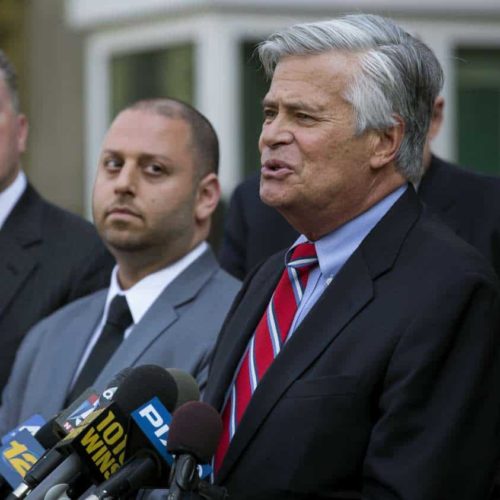Introduction
Another day, another jolt to the precarious credibility of New York’s political system. State Senate President Dean G. Skelos of Long Island was arrested Monday morning, marking the latest in a steady stream of corruption cases to emerge from the Empire State.
Skelos and his son, Adam, were charged by federal prosecutors with multiple counts of conspiracy, bribery and extortion as part of an alleged scheme to leverage the senator’s power to enrich his son.
In a statement, the senator said Monday that he is “innocent of the charges leveled against me.”
The federal complaint details a broad and complex alleged campaign dating back to 2010 to win business for the younger Skelos, primarily through the influence of a powerful real estate development firm. Drawing on emails, tapped phone conversations and information provided by two cooperating witnesses, prosecutors say the elder Skelos asked the developer, Glenwood Management, to provide business to his son but asked that the money not come directly from Glenwood.
The complaint says the younger Skelos eventually received more than $200,000 this way, though most of the money actually came through an environmental wastewater treatment company in which Glenwood’s founder and a top executive were investors. The money was a coup for Adam Skelos who, according to the complaint, acknowledged to an executive at the environmental company that he “literally knew nothing about water or, you know, any of that stuff.”
Christopher P. Conniff, a lawyer for Adam Skelos, said his client is not guilty of the charges.
In return for the payments, Sen. Skelos allegedly worked in several ways to benefit Glenwood and the wastewater treatment company, AbTech Industries, including helping to secure real estate tax breaks, facilitating a $12 million county government contract for AbTech, helping AbTech lobby unsuccessfully to legalize hydraulic fracturing in the state and pushing for changes in the 2015-2016 budget that would have increased funding for stormwater infrastructure.
Neither Glenwood nor AbTech was named in the complaint, and neither has been charged. In a statement, AbTech said it is cooperating with investigators. Alan Levine, Glenwood’s lawyer, declined to comment.
The charges come less than four months after another New York power broker, then-House Speaker Sheldon Silver was arrested on corruption charges. That arrest actually led the Skeloses to become more careful in their dealings, according to the complaint. In February, Adam Skelos began using a second “burner” cellphone and asked his father to speak to him using FaceTime, the iPhone app, in an effort to evade detection. The following month, he was caught on a wiretap telling his father that “you can’t talk normally because it’s like…Preet Bharara is listening to every…phone call.”
Bharara, the U.S. attorney behind both the Skelos and Silver cases, was indeed listening. “Public corruption is a deep-seated problem in New York,” Bharara said at a news conference Monday announcing the charges against Skelos. “And we are deadly serious about tackling that problem.”
Last month, New York state lawmakers passed a package of ethics reforms that will require them to disclose more about the sources of their private income, further restrict the use of campaign funds and increase disclosure of independent political spending. But reform advocates said the measures fell far short of what’s needed and failed to address several key sources of the state’s corruption challenges.
Chief among those is an odd quirk of New York’s campaign finance law that allows virtually unlimited contributions, a central part of the web of relationships involving Glenwood and Skelos. Glenwood Management, and its founder Leonard Litwin, was apparently a key player in Silver’s case as well, and Litwin and the firm have used a network of limited liability corporations to give more than $10 million to state candidates in New York since 2005, more than anyone else in that time period, according to the Silver complaint.
Under New York state law, limited liability corporations, or LLCs – which as their name implies limit the personal liability of their owners and provide tax benefits – are subject to the same rules as individuals: they can give as much as $150,000 total to candidates and political committees in a calendar year. However, while an individual can only give once, the law doesn’t prevent someone from establishing multiple limited liability corporations, which can then each give as much as $150,000.
The Skelos complaint, for example, details five $20,000 donations made on the same day by LLCs connected to Litwin to the Erie County Republican Committee.
The complaint doesn’t indicate that the contributions were illegal and Bharara declined to say whether he is investigating them.
Litwin is part of a growing wave of political donors who have turned to LLCs for political giving as a means of maintaining anonymity and evading limits on individual donors. Since 2010, donors have given more than $33 million to federal super PACs through LLCs. While federal rules require super PACs to disclose the names of their political donors, they are not required to identify who is behind money they receive from LLCs.
These types of corporations are also the preferred vehicle for donations from the emerging political kingmaker Manoj Bhargava, the founder and CEO of 5-hour Energy, who has given more than $5 million to state candidates and political committees since 2009, primarily through a handful of the more than 70 LLCs to which he is connected.
Another recurring theme in New York has been the abuse by lawmakers of community-based nonprofits to embezzle funds, an issue highlighted by the Center for Public Integrity in a 2013 report.
Over the past two years, at least 13 sitting or former New York lawmakers have been arrested, convicted, sanctioned or resigned as a result of ethics transgressions. The state ranked 37th, earning an overall D grade, in the State Integrity Investigation, a 2012 analysis and ranking of state government accountability and transparency conducted by the Center, Global Integrity and Public Radio International.



Join the conversation
Show Comments